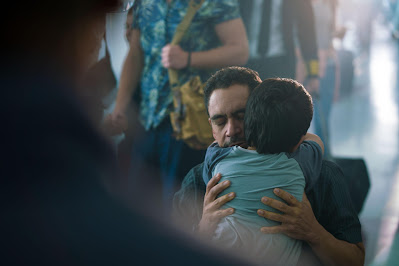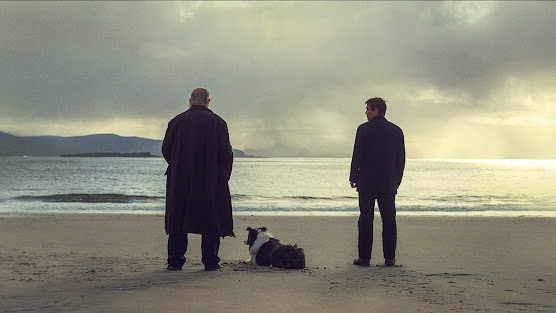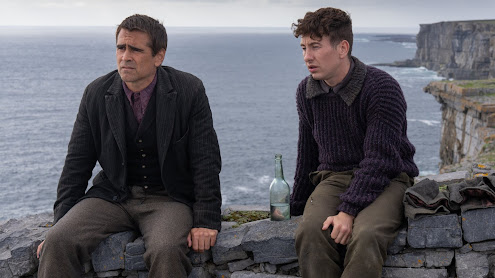This intimate take on a werewolf story is wonderfully parsed-down. Centering around a family of dad, mom, and daughter, a remote farmhouse, and vast woods. There's a werewolf in there somewhere. Not hard to guess. And the transformation aspect is a body-horror metaphor that drives the family drama. Not hard to see coming, either. Which isn't to say it's not good. I like horror movies where the monster is a metaphor. (The last movie I liked enough to review here was Godzilla Minus One.) But it isn't to say it is good, either. Predictability doesn't necessarily dampen a movie's impact, nor does including a plain metaphor guarantee it.
 |
| Directed by Leigh Whannel, with Christopher Abbott in the lead. |
It seems to me that Wolf Man's problem is the clash of two good ideas. On one hand, there's the plain-spoken and effectively drawn metaphor of turning into the wolf-man being likened to having a genetic disease. On the other, a theme, equally as plain-spoken, that a father's job is to protect his children. I can imagine holding those two elements in my hands and feeling the storytelling glee of combining them in a beautiful, meaningful and clever way. And it does start out this way. We see the similarities between the dad and his father, who was protective but cold and angry, in how he tries to be a protector, but not like his father was, and yet fails into it from time to time. And when the dad is scratched by a strange creature in the woods and slowly begins to change, obvious parallels of a degenerative disease come into play in some interesting and horror-ific ways.
Here is where the movie had its most effective storytelling. How it shifts from the dad's confused and false perspective to the mom's equally confused but terrified and real one. How it slowly builds on, and has thoughtful reveals of, each aspect of his condition. The way these moments are filmed and portrayed, especially visually, but even taking into account more than the visual aspect of film, felt unique to me. And the building drama in this section is sweet and sad, juxtaposed with dread and discomfort. Here we wonder what will happen, while simultaneously knowing, and we can't turn away.
 |
| I love that it used practical effect but not in a show-off way. Kept me immersed. |
But when the progress reaches a head, plot decisions must be made and implemented. In the moment, I was invested in the turns taken in this section, but I lost that thread of dreadful understanding which the story had provided so effectively earlier. Here is where the story's theme should start to become a thing proved (or disproved) instead of merely said. But instead of interweaving with the metaphor, it seems to get lost in the shuffle of moving parts and ending set-up, and is, as far as I can tell, wrapped up before the finale even starts. But without this theme to add new perspective, what interest or deeper meaning is there in a clear metaphor with an inevitable conclusion?
The story falters instantly. From there, some classic horror storytelling takes over, with plenty of good moments as far as technical filmmaking goes. Jump scares, gore, dramatic suspense, practical effects achieving some solid but not gratuitous body horror—all things we're here to see—but all getting drier and drier as the movie flounders to build a thematic ending from scratch in a fraction of runtime. In the end, the theme and the metaphor aren't a clever combination of two unique human realities portrayed in the fantastical form of a monster. The metaphor just is what it plainly is. And the theme is what the metaphor is, too, adding nothing new. Unlike with the wolf-man himself, a transformation I was disappointed to witness.















